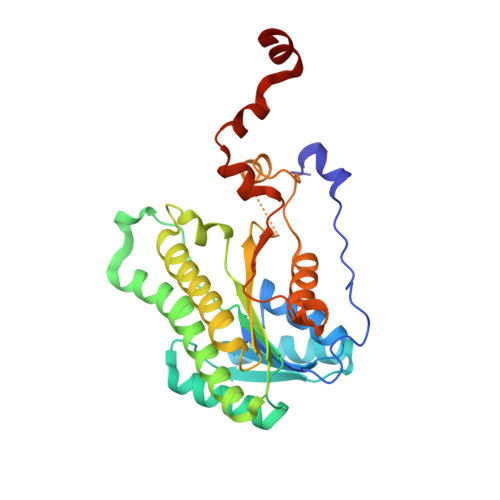RNase L-activating 2'-5' oligoadenylates bind ABCF1, ABCF3 and Decr-1.
Govande, A.A., Babnis, A.W., Urban, C., Habjan, M., Hartmann, R., Kranzusch, P.J., Pichlmair, A.(2023) J Gen Virol 104
- PubMed: 37676257
- DOI: https://doi.org/10.1099/jgv.0.001890
- Primary Citation of Related Structures:
7UCW - PubMed Abstract:
A notable signalling mechanism employed by mammalian innate immune signalling pathways uses nucleotide-based second messengers such as 2'3'-cGAMP and 2'-5'-oligoadenylates (OAs), which bind and activate STING and RNase L, respectively. Interestingly, the involvement of nucleotide second messengers to activate antiviral responses is evolutionarily conserved, as evidenced by the identification of an antiviral cGAMP-dependent pathway in Drosophila . Using a mass spectrometry approach, we identified several members of the ABCF family in human, mouse and Drosophila cell lysates as 2'-5' OA-binding proteins, suggesting an evolutionarily conserved function. Biochemical characterization of these interactions demonstrates high-affinity binding of 2'-5' OA to ABCF1, dependent on phosphorylated 2'-5' OA and an intact Walker A/B motif of the ABC cassette of ABCF1. As further support for species-specific interactions with 2'-5' OA, we additionally identified that the metabolic enzyme Decr1 from mouse, but not human or Drosophila cells, forms a high-affinity complex with 2'-5' OA. A 1.4?? co-crystal structure of the mouse Decr1-2'-5' OA complex explains high-affinity recognition of 2'-5' OA and the mechanism of species specificity. Despite clear evidence of physical interactions, we could not identify profound antiviral functions of ABCF1, ABCF3 or Decr1 or 2'-5' OA-dependent regulation of cellular translation rates, as suggested by the engagement of ABCF proteins. Thus, although the biological consequences of the here identified interactions need to be further studied, our data suggest that 2'-5' OA can serve as a signalling hub to distribute a signal to different recipient proteins.
Organizational Affiliation:
Department of Microbiology, Harvard Medical School, Boston, MA 02115, USA.















